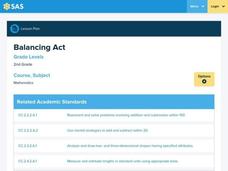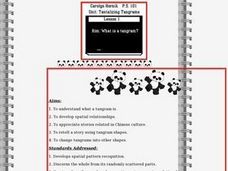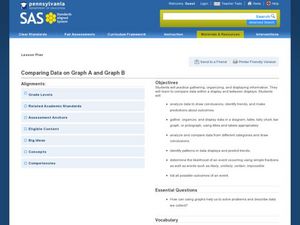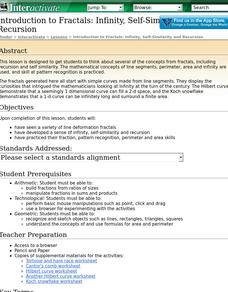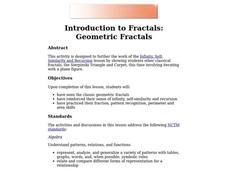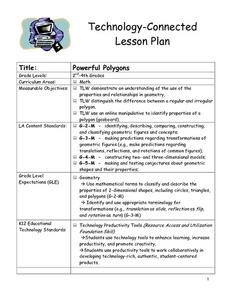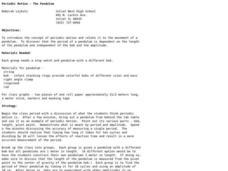Curated OER
Usefulness of Irrigation
Students explore irrigation. In this science lesson plan, students show that water is necessary for plant growth and show how a dam can turn a nearly useless water way into a valuable form of irrigation.
Curated OER
Phenomenological Pizza
Students explore measurement in terms of pizza toppings. In this math lesson plan, students draw a circle using string and a ruler, determine areas of different size circles, find how many two topping pizzas can be made using 14...
Curated OER
Balancing Act
Second graders identify the attributes of various shapes and estimate the weight of the objects. In this geometry lesson, 2nd graders identify the attributes of concrete objects and use a pan balance to weight them.
Curated OER
Design Project: DC Motor
In this DC motor worksheet, the learner answers 3 open-ended questions pertaining to the design of a DC motor. The worksheet is printable and the answers are revealed online.
Curated OER
What is a Tangram?
Students identify a tangram. In this geometry lesson, students read Grandfather Tang's Story and retell each story using the tangrams on a flannel board. Students use tangrams to complete an included worksheet.
Curated OER
That's So Square
Students familiarize themselves with the three most common geometric shapes: circles, triangles and parallelograms. They sketch, sort, and name the shapes.
Curated OER
Data Handling
In this data handling worksheet, students interpret data found in table, graphs and charts. They organize data and draw bar charts. This two-page worksheet contains 2 multi-step problems.
Curated OER
Comparing Data on Graph A and Graph B
Second graders gather and graph data. In this graphing lesson, 2nd graders collect data and graph this information using tally charts, bar graphs, pictographs, or tables. They make predictions about the outcomes.
Curated OER
What are the Kinds of Triangles?
Fifth graders classify triangles. In this triangle lesson, 5th graders learn about the characteristics that make up a triangle. They are instructed through video, PowerPoint slides, and teacher-led demonstrations.
Curated OER
Kaleidoscope
Students explore energy by creating a light project in class. In this kaleidoscope lesson, students discuss the properties of light and how mirrors can reflect the energy in different directions. Students view a diagram of light...
Curated OER
Introduction to Fractals: Infinity, Self-Similarity and Recursion.
This lesson introduces students to the ideas involved in understanding fractals. They develop a sense of infinity, self-similarity and recursion and
Curated OER
Periodic Motion - The Pendulum
Students study the concept of periodic motion and relate it to the movement of a pendulum. They discover that the period of a pendulum is dependent on the length of the pendulum and independent of the bob and the amplitude.
Curated OER
On the Road Again
Students examine migration patterns in Africa and China. They watch excerpts from a documentary, define key vocabulary words, complete various student organizers, and create a poster.
Curated OER
Introduction to Fractals: Geometric Fractals
Students study and observe the patterns made by the areas of the Sierpinski Triangle. Students use the computer to draw two or three iterations to discover the number patterns. Students complete worksheets based on Geometric Fractals.
Curated OER
Geometric Fractals and the Chaos Game
Learners define fractals and patterns. They explore how a seemingly random process can result in a pattern. Students practice probability and fractions skills by playing the chaos game online.
Alabama Learning Exchange
The Moon's Craters
Fifth graders investigate the formation and size of impact craters. In small groups, they conduct an experiment that involves dropping marbles into flour and measuring the impact from various heights and discussing their hypothesis and...
Curated OER
Powerful Polygons
Students scan the classroom to find different common shapes. They listen as the teacher defines polygon and regular polygon. The teacher demonstrates regular polygons via the Internet and the "Math is Fun" web site. Students go outside...
Curated OER
Making Benchmards--Length
Students explore the idea of having Benchmarks to estimate the length of given objects. Students demonstrate acquired knowledge of the basic units of length by making reasonable estimates. Students create a personal benchmark.
Curated OER
Time: Attribute
Students participate in five teacher-led, whole class activities that explore sequences of time and the concept of faster and slower. They sequence school day events, create a book of their daily schedule, put the days of the week in...
Curated OER
Weather Dot Com
Students examine the need for a standard unit of temperature and measure temperature with a thermometer. They discuss the details of a thermometer and the calibrations used, record temperature data for inside and outside, explore...
Curated OER
The Sun: Earth's External Heat Engine Part 1 of the Astronomy Model
Students become familiar with the variables that control Earth's solar energy supply. They explore the source and nature of solar energy, the genesis of radiation, and the structrue of the Sun, gas spectra are observed and sample...
Curated OER
Similarity and Congruence
Students determine that two figures are similar or congruent by
investigating figures that are similar and figures that are congruent. They prove that two figures are similar or congruent by using definitions,
postulates, and theorems.
Curated OER
Periodic Motion - The Pendulum
Students experiment to determine the period of a pendulum. In this periodic motion lesson, students use different pendulums to determine their periods. They use various amplitudes to determine its effects on the period.
Curated OER
Are All Children at the Same Starting Gate?
Learners examine the education experience around the world. In this global studies lesson, students research education standards and practices in developing and developed nations. Learners share their research findings in a class project...




